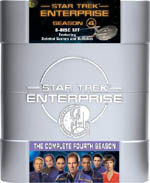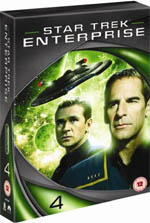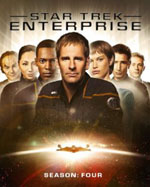96-97: Demons / Terra Prime
And now we come to the two-part story that many fans regard as the true final adventure
of Enterprise NX-01, and indeed it does mark the true end of their fourth year. Thankfully,
there is a lot to like in this one, easily making it one of the best tales of the fourth season.
What is primarily on display here is the crowning moment of resolution to the season's
saga of political alignment of all the alien races that will become key founding members
of Star Trek's future Federation. The final challenge tackled here is Humanity's remaining
xenophobia, most tangibly expressed against Vulcans. In many ways, this creates a kind of
a bookend effect on the "Enterprise" series, as many of the Human crew of NX-01 are ready to
go to bat for Vulcans and any other alien species, which shows how much they've grown and
gained wisdom on their four years of exploration.
Star Trek often gets to explore some really cool way-out unknowns amongst the galaxy,
but perhaps because this is such a change from the norm, I also found it quite refreshing
to explore primarily Earth, and the moon, and Mars in this story. Because these are better
known celestial bodies with more tangible challenges to Human colonists, the exploration
of space feels a bit more real in this one. It also gives us great insight into the state
of Mankind's technology and social development outside of the über-familiar Starfleet
vessels. All this feeds into the theme summed up in Archer's final speech: that sometimes
the more interesting explorations are of the inner variety. Staying inside our own solar system
to see how we far we developed 150 years from now is very worthwhile. Plus, it affords us a lot
of great visuals, and Enterprise delivers once again.... even avoiding the standard cave sets
to achieve a more specific look, and thankfully refraining from the smoke machines and dark lighting.
Thank you!
One thing I hadn't remembered that almost knocked me off my chair was that
Travis Mayweather actually gets a very heavily fleshed-out subplot to engage him,
and particularly well during the first half. Whether or not the actor was able
to stretch his range far enough to accommodate all the angles may be debatable,
but to me this seemed to be the best Mayweather story yet, which was refreshing.
In fact, Hoshi and Reed also have their moments to shine in this one, making the
whole cast feel like a more successful and unified ensemble than most of the rest
of the series thus far indicated.
Interesting is the casting choice of Peter Weller as the story's lead antagonist
Paxton. Weller really brings alive and makes real a role that could have been boring
and preachy in less inspired hands, and he really seems to make Paxton feel multi-dimensional,
his concerns both relevant and misguided at the same time. A good villain can
possibly make or break a story, and these two episodes got a very good one here.
What is additionally interesting is, three stories later in Trek production schedules,
Peter Weller will be back in
"Star Trek 12: Into Darkness" playing another
hard-hitting character. While he's also good in that, I think Paxton in this story
is the better and more enjoyable of the two roles.
The one part of this plot that fell down a bit with me concerns the whole
angle of Trip and T'Pol's baby daughter. First of all, surely the existence
of a Human-Vulcan hybrid is a moot point after the events of
"E Squared" near the end of last season,
where T'Pol and Trip's offspring had
successfully grown to middle-aged adulthood. In fact, he may still be out there
somewhere. It's bizarre how completely this story appears to have forgotten him.
Perhaps more troublingly, considering the villains' actual
motivations, it doesn't make much sense that they would go to the trouble to
create the daughter. And what plans do they have for her? How would those
plans not do more to work against their goals rather than for? On one hand,
this seems like a minor nit, until you realize that the daughter motivates
nearly all of T'Pol and Trip's movements in the story, without which the villains'
main strategy would be more easily countered. Did the villains calculate all that to help
hold off Enterprise? Perhaps that's asking for too much foresight from the villains,
and/or too much reliance on chance. The connecting logic between the events and
their timing could use work, but thankfully the philosophical themes and debates
weigh in quite strongly in this one, keeping it all worthwhile in the end.
At any rate, anyone wanting to go through the highlights of "Enterprise"
absolutely must watch these two episodes. Many pivotal moments for "Enterprise"
and Star Trek in general are here, and Scott Bakula's team pulled off two of its
finest hours with this adventure. Although "The Forge" was perhaps slightly better,
the full 3-episode story it was a part of won't top the story we got here.
Next, read the In-depth Analysis Review for
the infamous last episode of Star Trek on television:
"These Are the Voyages..."
|
|








 slimline
slimline



